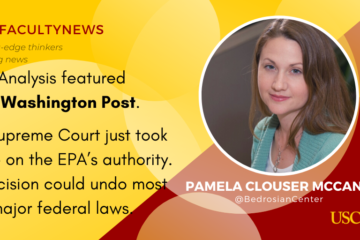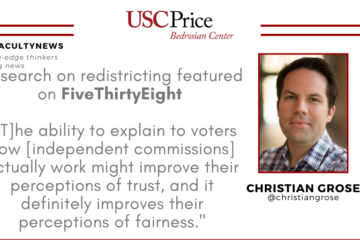Zerunyan helps shape public leadership from South Africa to Armenia

(Courtesy of Frank Zerunyan) Professor Frank Zerunyan was the the keynote speaker at
the City of Tshwane’s inaugural conference on Leadership
in Local Government.
USC Price School of Public Policy Professor Frank Zerunyan furthered his efforts to impart lessons in effective governance and public-sector leadership across the globe with recent speaking engagements and workshops in the nations of South Africa, Armenia and Georgia.
Local lessons, global impact

Zerunyan with the city manager of Tshwane (Photo courtesy of Frank Zerunyan)
In May, Zerunyan, director of executive education at the USC Bedrosian Center on Governance, was in South Africa to serve as the keynote speaker at the City of Tshwane’s inaugural conference on Leadership in Local Government.
His speech focused on collaboration from the public, private and nonprofit sectors to produce good governance, and how leadership connects all thematic subject matters that fall under implementation and sustainability in local government. Many of the insights came from his new co-authored book Newgotiation for Public Leaders: The Art of Negotiating for a Better Outcome.
Following the address, Zerunyan took part in a panel discussion with Tshwane’s deputy mayor, city manager and chief economist. For his first trip to South Africa, he fit in a visit to the Union Buildings that house the country’s government and presidential offices, featuring a monument to former president Nelson Mandela.
“Frank Zerunyan’s expertise and knowledge from an academic perspective coupled with his experience as an elected official brought such a fresh, worldly insight for consideration in our transformational and developmental agenda of leadership in local government,” said Khabonina Dlamini, director of stakeholder management for the City of Tshwane. “He sparked the debate on the subject of contract cities versus full-service cities, strategic partnerships and collaborations, and private-public partnerships, which are issues that our local government sector needs to further explore… in trying to solve the service delivery challenges that have dire consequences to the development of our communities.”
Collaborative governance

Zerunyan in Tbilisi with his United Nations colleagues and the president of Caucuses University, second from Left (Photo courtesy of Frank Zerunyan)
In Tbilisi, Georgia, Zerunyan participated in the closing panel and taught at a workshop during the annual conference of the Network of Institutes and Schools of Public Administration in Central and Eastern Europe, in conjunction with the United Nations Department of Economic and Social Affairs Capacity Building Branch.
The conference’s theme centered on how insourcing and outsourcing can contribute to public administration reform. Zerunyan focused on the outsourcing topics of contrasting partnerships and public-private collaboration, which he explained are not a magic bullet in solving public administration challenges.
“All of this was very well received as I spoke about implementation and sustainability in governance by highlighting our collective research and practice in information sharing, nurturing networks, engagement and – the glue of them all – leadership,” Zerunyan said. “I described the role of collaborative governance in sustainability as well as the implications studied by our students in transparency and accountability, public access and financial commitment.”
In his workshop, he described a logic model for the application of what is known as the “collective impact” theory in public administration that was developed by his practicum students at USC Price. The U.N. Department of Economic and Social Affairs Capacity Building Branch, for which he serves as an ad hoc expert on public administration, has plans to use the model in evaluation of future projects in the U.N. Service Awards Program, Zerunyan noted.
The Capacity Building Branch was in Georgia in conjunction with the conference, and Zerunyan also presented at the plenary session on innovative public administration and conducted two days of workshops for government officials.
Improving public leadership capacity

Zerunyan with representatives from Armenia’s Department of Defense (Photo courtesy of Frank Zerunyan)
Following the workshops in Tbilisi, Zerunyan was asked to return to Yerevan, Armenia, to offer additional training for public leaders after making an initial trip to the country last year with USC Price Professor Dan Mazmanian. He taught an intensive program at American University in Armenia over three eight-hour days to high-level public officials from the ministries of Defense, Justice, Public Service, Territorial Affairs and National Security.
The curriculum matched what has been prepared for the Global Leaders program at USC Price, offering lessons in collaborative governance, public ethics, the role of human capacity and leadership, and negotiation for public leaders. Zerunyan also lectured at the Public Administration Academy of the Republic of Armenia and for the staff of the Ministry of Diaspora.
Over the past two years, the well-traveled Zerunyan has also been to Bahrain, Brazil, Dubai, Ethiopia, India, Saudi Arabia, and South Korea to lead workshops for government officials and participate in conferences and capacity-building projects.
“My experiences in teaching are absolutely incredible,” Zerunyan said. “I thank all of my colleagues who help me be who I am, and especially my dean and school administration that allows me to serve this special mission of teaching governance and leadership not only at USC Price but also around the world.”



